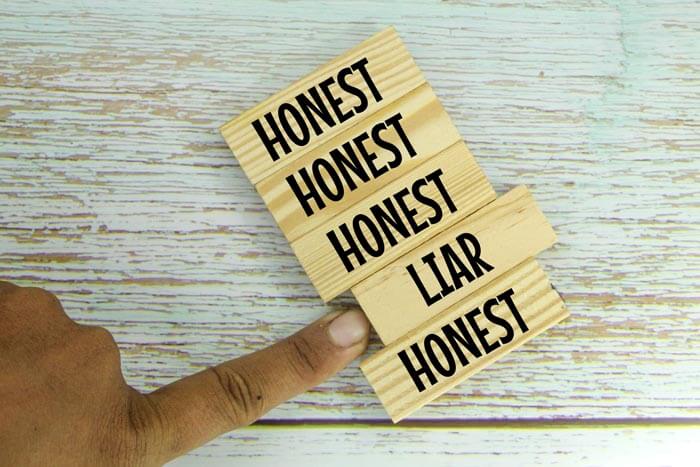How to Teach Children Not to Lie
Contents
- 1 Kids Cannot Distinguish Between the Truth and Imagination
- 2 Don’t Want Your Child to Lie? Start With Yourself
- 3 Fear Can Push Children to Lie
- 4 Be Honest, Kind, and Patient With Your Kids
- 5 Teach Them the Value of Honesty
- 6 Lower Your Expectations; Kids Have a Smaller Capacity
- 7 Don’t Be Harsh With Children
- 8 A Few More Tips
- 9 Conclusion
It seems like a joke at first, but it can soon become the source of many problems. From where does the tendency to lie originate? Probably in one’s childhood. So the real question is, how can we teach kids to avoid lying? Keep reading to find out.
Kids Cannot Distinguish Between the Truth and Imagination
Lying is a major sin in Islam and a violation that can turn into a habit. Liars are wrongdoers. The Quran criticizes and warns the liars in the Quran:
فِي قُلُوبِهِم مَّرَضٌ فَزَادَهُمُ اللَّهُ مَرَضًا ۖ وَلَهُمْ عَذَابٌ أَلِيمٌ بِمَا كَانُوا يَكْذِبُونَ
There is a [spiritual] disease in their hearts, so God increased their disease, and they will receive a painful punishment because they used to lie [against God]. (2:10)
To teach children not to lie, we should first find out why they lie, some of which may include:
Children cannot distinguish between their imaginations and reality. Therefore, most of the time, they’re describing their imaginations, mixing them up with reality, not lying. Their imagination is not always aligned with reality, and it can be full of exaggeration. Still, kids under six cannot distinguish the boundaries between them.
No reason to get angry with them. Some psychologists believe that this is simply their procedure of growing up. Kids do not have the same concentration or memory as adults. Therefore, they usually can’t remember what exactly happened in the last few days. As a result, they replace the gaps with what they imagine to be true. Consequently, it wouldn’t be right to expect them to recollect what happened or what they did.
Don’t Want Your Child to Lie? Start With Yourself
To children, their parents are perfection and simply the best. They look up to them and wish to be just like them. They depend on their parents, and they are the embodiment of everything they can’t do. Therefore, the most important example kids follow is their parents or the next-best example that parents leave for them (e.g., some parents leave their kids to the mercy of television, shows, and tablets, yikes!).
A child who sees their parents lie will learn and follow. A typical example is when someone calls home, and you tell your child to answer the phone and lie that you are not home. That’s literally teaching them to lie.
Don’t want your children to lie? Start with yourself.

Fear Can Push Children to Lie
People will do anything to relieve themselves from a threat. However, the definition of “threat” is different from person to person. What seems small and ridiculous to us may seem great and significant to children. For kids, the fear of simply being told off can be considered a major threat — danger — and can trigger a lie. Sometimes parents force their kids to tell the truth, but all it does is push them to lie because they fear rapprochement or even physical violence.
So, whether the feeling is legitimate or not, a child who feels threatened cannot be expected to necessarily tell the truth. Beyond that, causing fear in children is not a suitable way to approach them. Researchers believe that children of strict parents lie more than children of normal parents.
Be Honest, Kind, and Patient With Your Kids
Kids lie more when they are five to eight because they are under the pressure of teachers and parents, which they want to get rid of. However, their lies are easily caught by their parents.
Treat your children with kindness and patience so that they won’t be forced to lie. Otherwise, you would be paving their way to becoming liars.
Teach Them the Value of Honesty
The best type of obedience comes from understanding. We should not behave well just because it’s a must, but because we understand its value. Similarly, children must be taught the value of honesty. This way, they will prefer it without being forced to. As always, remember to be polite, kind, and patient during the procedure to not drive your child away—also, your behavior is the most important source kids imitate.
Lower Your Expectations; Kids Have a Smaller Capacity
Another point is that we must understand that children are much less capable than we are. Therefore, we must lower our expectations and be flexible. If we impose a burden beyond their capacity, they will try to relieve themselves by lying.
Don’t Be Harsh With Children
Be careful not to be harsh with kids when they lie. Their lies are not as serious as you think because, usually, it is not a troublemaker. Instead, teach them the consequences of lying.
For instance, change the way you speak with children. For example, instead of asking, “Did you finish your dinner?” ask them, “Why didn’t you finish your dinner?” The first question may provoke them to lie, but the second question helps them explain themselves to themselves and explore why they made the decision they made.
Don’t be harsh, but don’t be too lenient either. Kids must understand that lying is wrong, so react slightly and explain the result of their lying. They should learn that lying is wrong. Treat children in a balanced manner—neither so lenient that they would not care that they lie nor so tough that they would be scared to be honest.
A Few More Tips
- Teach your children how to make up for their mistakes and be kind during the procedure. They will no longer be forced to lie and will have learned an acceptable way to correct their mistakes.
- Try to solve the child’s problems rather than punishing or discovering their fault. Refrain from falling into arguments or shouting at your kids.
- If your child blames someone else for his own mistake, try to teach him that his wrong deed has a bad result and he should not repeat it.
Conclusion
A child’s lying may have different causes, but we must address it from its core. Children under 6 cannot distinguish the borders between their imaginations and the truth. So most of the time, children are actually describing their imaginations, which is sometimes far from the truth and embellished. We should be careful that lying doesn’t become a habit, but we should not take it too seriously like it’s the end of the world.
Do not be harsh with children. They are easily intimidated by threats, so, understandably, they would lie to prevent a punishment or shout or whatever by a parent. Threatening is not a suitable way to treat kids. Researchers believe that children of strict parents lie more than their peers with normal parents. Kid’s lies are not as serious as you imagine.
Kids follow their parents as their example; lying parents will raise lying kids. Sometimes, parents unintentionally teach their children to lie. For example, when somebody calls, they tell their children to say that their parents aren’t home.
Children’s lies usually do not cause problems when they are small. However, you must prevent them from making it a habit. Teach them the consequences of lying. Change the way you speak with children. Instead of asking, “Have you done your homework?” ask them, “Why haven’t you finished your homework?” because the first question leads them to lie.

